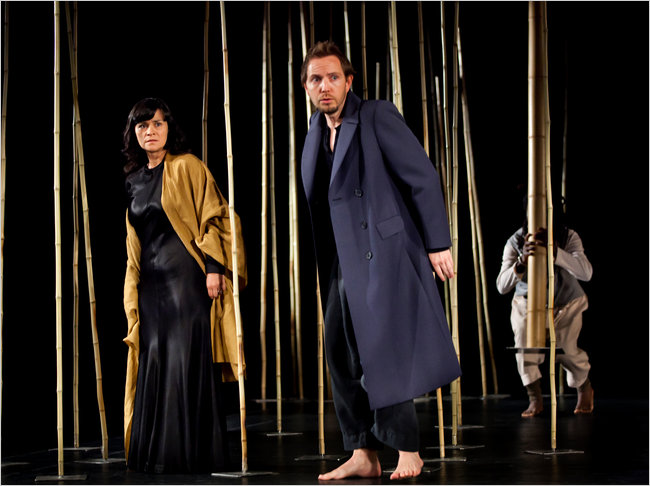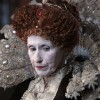A Magic Flute, Peter Brook
reviewed for The Spectator,30 March 2011

Malia Bendi-Merad, as Queen of the Night, left, and Raphaël Brémard as Monostatos.
A new opera has breezed through London’s Barbican Centre. It’s a tale of arduous quests, initiation and male friendship, lyrical in its romantic sweetness, and vaguely reminiscent of the later Mozart. But Mozart’s The Magic Flute it most certainly is not.
It is always courageous to take on the opera purists, but it is not quite clear how bold the usually fearless Peter Brook has been in titling his adaptation A Magic Flute. It is scarcely a step away from the original title: just enough of a retreat to avoid comparisons to conventional productions, but not exactly a leap into the unknown.
Musically, the production is as lily-livered as the title suggests: tediously brief when stripped down to 90 minutes, there is little room for the darker undercurrents or counter-themes. Only the conclusion of Papageno’s story is left intact – with an extra aria found for his lover, Papagena, in her disguise as the Old Woman – a Greatest Hits moment so overloaded with comedy and cumbersome props it feels grossly detached from the low key feel of the rest of the production.
By contrast, the other famous set piece, the Queen of the Night’s ‘Der Hölle Rache’, is underplayed. There is no sense of the demonic, chaotic power which sets her so at odds with Sarastro’s Rationalism. The musical mood is set by the longueur of the Mozart’s D minor Fantasie, woven into the score by composer-pianist Franck Krawczyk, rather than the forceful E-flat chords of the original overture.
The sense of magic which has marked Brook’s nearly 70-year career hovers, tantalizing, throughout. When Brook first staged Carmen 25 years ago, he removed the orchestra from the pit and hid it in the wings. Supposedly, he wanted no barrier between the audience and the performers. Like the best of Brook, La Tragédie de Carmen was radical, controversial and visionary – because behind the bombast of a theatrical Spanish town lay a story of four private voices weaving in and out of each other’s sexual lives: a story which richly rewarded adaptation for a new, intimate space.
Mozart’s opera is less suited than Bizet’s to the contemplative, intimate mode that has marked the later stages of Brook’s career. The complete removal of the orchestra robs the Principals of their cosmic accompaniment, and the piano on the side of the stage makes the matter at hand feel more like an evening of several Lieder than an allegorical complex of the titanic struggle between competing forms of knowledge and power.
But humbler, tricksy powers are engaged at every turn. The slim bamboo canes, which delineate forest paths and temple boundaries, are deftly transformed in the hands of Brook’s actors, particularly the Ariel-esque Abdou Ouolguem, a nameless spirit, who infuses the spoken dialogue with an idle wit. Rather than make the piece feel fragmented, the use of French speech by actors, alongside the original German libretto sung by the singers, heightens the magic of the strange world created on stage, a world with its own hybrid and artificial speech.
None of this, though, is enough to make up for the lost power of the original score, in a production which seems like a poor attempt at an introduction to the opera for unfortunate children, rather than the groundbreaking reimagining one might expect from such an exceptional director.






